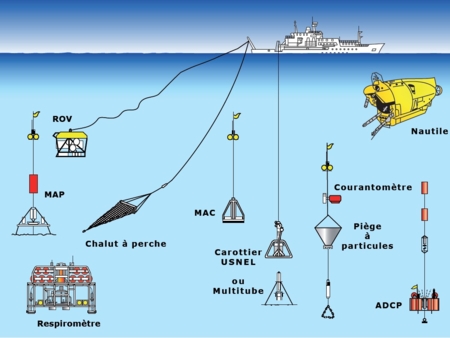LIA Microbsea
The inauguration of the Franco-Chinese Associated International Laboratory (LIA) for Deep Sea Microbiology, called MICROBSEA, took place on 28 November 2018 at the Brest Iroise Digital Pole. It was created following 10 years of scientific cooperation between the Microbiology Laboratory of Microbiology of Extreme Environments (LM2E) of IUEM and a Chinese laboratory for marine biogenetic resources based in Xiamen.
MICROBSEA OBJECTIVES?
The purpose of this cooperation is to carry out activities focusing on the microbiology and ecology of deep-sea hydrothermal ventss, which are vents observed at ocean ridges between 500 and 5000 metres depth. The main objectives of this LIA are to improve knowledge of the diversity and biology of microorganisms in deep oceanic hydrothermal habitats, and to better understand how this unique ecosystem functions, by addressing the issue at different scales from the microbial community to the molecular scale.
THE SCIENTIFIC PROJECT
The project has several interconnected tasks and several aims:
- An axis to cultivate representatives of prokaryotic lineages that do not have yet-cultured representatives and to describe new viruses from oceanic hydrothermal vents.
- An axis aiming at providing information on the specific and functional microbial diversity of hydrothermal vents from the Southwestern Indian Ridge, which has so far been poorly documented and could be compared to those in the Atlantic and Pacific.
- An axis on the study of adaptive processes developed by microorganisms to counteract extreme conditions in their natural habitat (high temperature and pressure).
ORGANIZATION
A LIA is a "laboratory without walls" that brings together a CNRS laboratory and a laboratory from another country around a jointly defined project. These laboratories pool human and material resources for the implementation of the project. For MICROBSEA, the partners are the Laboratory of Microbiology from Extreme Environments(LM2E), which is a Joint Research Unit of UBO, CNRS and Ifremer and the State Key Laboratory of Marine Biogenetic Resources (KLAMBR) of the Third Institute of Oceanography, State Oceanic Administration (SOA) in Xiamen, China. LIA MICROBSEA has a lifespan of 5 years, renewable once. The coordinators of the LIA are the researcher Karine ALAIN of LM2E and Professor Zongze SHAO of the Laboratory of Marine Biogenetic Resources of the Third Institute of Oceanography of China.
The laboratory will promote the co-supervision of doctoral theses and the exchange of students and staff between the two laboratories. On average, each laboratory will host one staff from the other entity each year for a long stay (≥ 3 months) and two other staff for short stays or visits. Annual meetings will be organized in France or China with several of the participants to present the progress of the research work.







